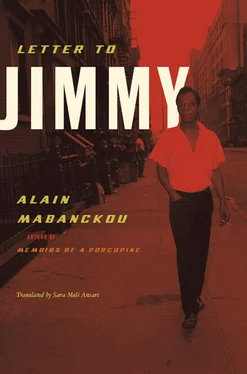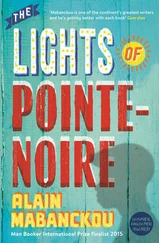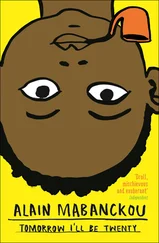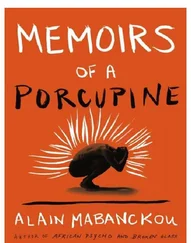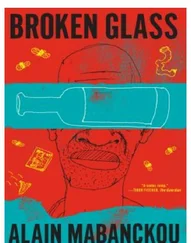8. on black anti-Semitism
In Harlem, black anti-Semitism is a reality. You decide to talk about it. The exercise is all the more delicate since by simply bringing up the topic you risk it flying back in your face like a boomerang. In his time, Karl Marx had been accused of anti-Semitism by his former teacher, Bruno Bauer, who had already drawn fire from all sides for having responded to the Jewish Question. Marx took up Bauer’s argument and asked whether they should be freed as a group before the general population. Although Bauer asserts with good reason that “we must free ourselves before freeing others,” Marx wonders to what extent freedom is possible in states that recognize the Declaration of the Rights of Man, but protect the idea of private ownership that allows owners to take advantage of their possessions in the most absolute way and, through such a power, to institute a system of exploitation to the detriment of society’s most destitute.
This is, with few exceptions, the subject of a controversial article you publish in the New York Times in 1967: “Negroes are Anti-Semitic Because They’re Anti-White.”
Is this article a re-writing of The Jewish Question by Bauer, adapted to the American context? In any case, you start with an observation: in Harlem, it is an understatement to say that you hate your landlords. Anti-Semitism might be motivated more by the miserable conditions in which black Americans live than by blind hatred toward a part of the population who may or may not control everything. In this ambivalent relationship between Jews and people of color, there is something of a game of mirrors that dates back to the time of black slavery. The suffering and persecution of Jesus is systematically compared to that of the slave at the hands of his master. But, in other respects, a black man borrows from Jewish history, takes it as his own almost to the last detail, and, because of this, “. . identifies himself almost wholly with the Jew. The more devout Negro considers that he is a Jew, in bondage to a hard taskmaster and waiting for a Moses to lead him out of Egypt.” 106
From where does this feeling of shared identity come? From the Bible, you assure us, since these “beliefs” from the Old Testament are of Jewish origin. In a reversal of roles, the term “Jew” would be used by blacks in Harlem to label “all infidels of white skin who have failed to accept the Savior” and who are responsible for the death of Christ. 107
This anti-Semitism is driven by more serious and subtle motives: the black man blames the Jewish man for “having become an American white man” who profits from this status that pulls him out of the “house of bondage” from which colored Americans struggle to escape, despite the fact that they “were there before, and for four hundred years. .” Jews want the black community to understand the suffering they have known, the acts perpetrated against them throughout history, and even in their daily lives. In the absolute, Jews and blacks share a common experience of suffering and rejection, the tradition of wandering, and the search for a homeland. But therein lies, in your opinion, the great misunderstanding between them: “The Jew does not realize that the credential he offers, the fact that he has been despised and slaughtered, does not increase the Negro’s understanding. It increases the Negro’s rage. For it is not here and not now, that the Jew is being slaughtered, and he is never despised here as the Negro is, because he is an American. The Jewish travail occurred across the sea and America rescued him from the house of bondage. But America is the house of bondage for the Negro, and no country can rescue him. What happens to the Negro here happens to him because he is an American.” 108
The example you draw on to support this argument is that of an African living in the United States. If the latter were a victim of some injustice, or of police brutality, he at least has recourse to the embassy of his native country, which will ensure his protection. An African has a country; he has a nation behind him. On the other hand, a black American who is wrongly imprisoned will find himself at a loss, will “find it nearly impossible to bring his case to court. And this means that because he is a native of this country. . he has no recourse and no place to go, either within the country or without. He is a pariah in his own country and a stranger in the world.” 109
Jewish people, you think, are not only considered Americans; they can rely on allies throughout the world. You deduce that it would not occur to anyone to suggest to Jewish people to be “nonviolent.” When they fought for Israel, this act was saluted as heroic: “How can the Negro fail to suspect that the Jew is really saying that the Negro deserves his situation because he has not been heroic enough?” 110
•••
You had been trained to despise Jewish people. The exasperation builds when you think of your neighborhood transformed into a slum: neglected apartment buildings, broken windows, peeling paint, sagging stairwells, faulty heating and cooling, and, needless to say, an unending stream of roaches and rats in the apartments. “When we were growing up in Harlem, our demoralizing series of landlords were Jewish, and we hated them. We hated them because they were terrible landlords, and did not take care of the building. . We knew that the landlord treated us this way because we were colored, and he knew that we could not move out. [. .] Not all. . were cruel. . but all of them were exploiting us, and that was why we hated them.” 111
Such allegations suggest that you generalize black anti-Semitism in Harlem — some are quick to accuse you of this — despite the irony your article employs to expose the roots of a hatred based on several misunderstandings. You point out that those facing you are Americans first and foremost, regardless of being Jewish. But can the latter be dishonest businessmen? “Jews in Harlem are small tradesmen, rent collectors, real estate agents, and pawnbrokers; they operate in accordance with the American business tradition of exploiting Negroes, and they are therefore identified with oppression and are hated for it.” 112
A latent animosity defines the power dynamic between the two communities. Black hatred toward Jewish people does not prevent them from playing a role, or from being hypocritical, because they require the services offered by those they loathe: “I remember meeting no Negro in the years of my growing up, in my family or out of it, who would really ever trust a Jew, and few who did not, indeed, exhibit for the them the blackest contempt. On the other hand, this did not prevent their working for Jews. .” 113
When it came time to discuss the thorny issue of the arrival of Jews and blacks on American soil, your arguments were far from convincing to your audience. For example, during a discussion with Budd Schulberg, who is Jewish, you make assertions that appall him: “I would like to insert a parenthesis on this point. . a dangerous parenthesis, but it will serve to clarify in some way the bitterness of the black American. Here it is: I was here before you. I mean to say, historically speaking. [. .] Historically speaking, I have been here for four hundred years. Let’s say that you stepped off the boat last Friday, and you didn’t yet speak English; on Tuesday I will be working for you.” 114
Schulberg’s shock is tremendous, and his scathing reply throws you somewhat:
“What you just said, ‘I was here before you,’ is a stupid Muslim argument.” 115
Schulberg in this way alludes to the theories of Black Muslims that are popular at the time with Elijah Muhammad (one of the founders of the Nation of Islam) and Malcolm X, who proclaim the supremacy of the black race, and who advocate fighting — by any means necessary — in the name of the Nation of Islam, which today is lead by Louis Farrakhan. The target of the fight is anyone known as the “white devil,” and, because of this, their theories are accused of being racist. Schulberg persuades you that such assertions are the crutches of fanatics and those who would believe in the supremacy of one group over an other, and that the “Aryans, too, believed the same thing.”
Читать дальше
